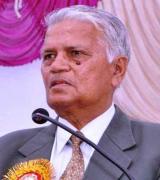Creation and Criticism
ISSN: 2455-9687
(A Quarterly International Peer-reviewed Refereed e-Journal
Devoted to English Language and Literature)
Vol. 08, Joint Issue 30 & 31: July-Oct 2023
 Dr. V. A. Gemini
Dr. V. A. GeminiCritique
Cultivating Nav Bharat: Ideal World in Gemini’s Poem
“Constructing a Hut, not a Palace with Words”
Sudhir K Arora
V. A. Gemini, an educationist and veteran author of repute creates a world of emotions in his poem, titled “Shabdo Se Mahal Nahi, Kutiya Chhaaungaa” (Constructing a hut, not a palace with words) which appears in his poetry collection Mein Padhyap, published by Dr. Kavya Saurabh Rastogi, the founder of Gemini Sahitya Foundation, Moradabad. This poem comes under the fourth category “Chintan Chashak” (Contemplation Cup). It reveals Gemini’s reflection on the ideal world of his imagination and can be compared with one of the poems from Tagore’s Gitanjali, titled, “Where the Mind Is Without Fear” where he seems to be reflecting on India of his dream.
Here is the complete Hindi poem, titled, “Shabdo Se Mahal Nahi, Kutiya Chhaaungaa”, published in Mein Padyap.
भाव-जगत का नृपति आज उद्घोषित करता
मैं शब्दों से महल नहीं, कुटिया छाउँगा।
महलो में रहती है जब कल्पना-कामिनी,
उसे वर्जनाओं में बंधकर रहना पड़ता है।
पर कुटिया का जीवन खगकुल का कलरब,
या सरिता का नीर सतत कल-कल बहता है।
कुटिया महल बनेगी, सुन सब झूम उठेंगे,
मैं भी उनके साथ-साथ नाचू-गाऊंगा।
झोपड़-पट्टी नए राज्य का केंद्र बनेगी
वंचित होंगे लसित राजसी परिधानों में।
रामचरितमानस अपना संबिधान बनेगा,
सदन बनेंगे नए खेत और खलियानों में।
समता, ममता, पावनता की पूजा होगी
भू को श्रम सिंचित कर नवभारत उपजाऊंगा।
दुराचार के पाहन गहरी चंचलता में
डुबो-डुबो कर संयम-सेतु बनाऊंगा मैं।
संत कबीर-रहीम-बिहारी के दोहो को,
पाठ्यक्रमों का अंग बनाकर हरषाऊँगा मैं।
निति-नियम, अनुसाशन मुख्य नियंता होंगे,
इनके बल पर ज्ञान पताका फहराऊंगा।
सुख-समृद्धि की फुलवारी पर कोहरा बनकर,
छायेगा जो उसका वंश-विनाश करूँगा।
पकड़ पाएंगे केवल लवकुश मेरे घोड़े,
उनका राज-तिलक कर सच्चा सुख पाऊंगा। (Mein Padyap 44)
Here is my translation of this poem, titled as “Constructing a hut, not a palace with words”:
the ruler of the world of emotions
declares today
that I will build a hut with words,
not a palace
the golden imagination
when it resides
in the palace
has to be bounded by the taboos
but, the life of the hut is
the tweeting of the birds or
the purling of the water of a river
that flows continuously
that the hut will be
the palace
will make all happy
I will also sing and dance with them.
the huts will be the centre
of the new state
the deprived will be adorned
with the royal apparels
the Ramcharitmanas will be
our constitution
new fields and barns will be
our houses
parity
purity
affection
will be worshipped everywhere
I will cultivate
Navbharat
by irrigating the land
with labour
I will drench
The clothes of evils
with deep playfulness
and construct the bridge of patience
I will be happy
to make the couplets of
Sant Kabir-Rahim-Bihari
a part of the syllabus
policy
rules
and discipline
will be the chief controller
with these policy rules
I will hoist
the flag
of knowledge
with happiness and prosperity
I will instill
courage, faith, patience, trust
in the worldly life of the whole country
I will destroy the dynasty
of those who attempt to be
the fog over the flower garden
of my happiness.
I will coronate Lav-Kush
and seek true pleasure
as they are talented enough
to catch my horses.
Gemini seems to be imagining ram-rajya in his country and wishes to create the feeling of vasudhev-kutumbukam. In this poem, he applies the sum and substance of the Sanskrit sloka which runs thus: “sarve bhavntu sukhina…..”
The poet has employed the word “Nav Bharat” in place of new India. The term “India” for Bharat reveals the colonial smell while the word “Bharat” shows the traditional and cultural approach to the country. The poem also displays the contest between the two terms “Bharat” and “India”. The poet prefers “Bharat” where all live happily and peacefully while aligning with each other and sharing in happiness and sorrows. ‘Hut’ versus ‘palace’ also becomes the focal point around which the idea of the ideal world revolves. Hut reveals nature while palace becomes a close book for nature as it supports reason. Feelings and emotions are attached to the hut while reasoning spirit is attached to the palace. Reasoning spirit requires rules and regulations and is bound by certain taboos. Even golden imagination when it resides in the palace has to be abide by certain taboos. The poet prefers not to live in the palace, but in the hut. He becomes so emotional that he wishes to build the hut with words. This is his contemplation over the worldly life of the people who like to live in happiness and this happiness can be found only in the huts, not in the palace where resides control and reasoning spirit. Hence, the declaration of the poet is not simply sentimental, but with some substance. The difference is of attitude and mindset. One who lives in the palace is not necessary that he will be happy. He cannot be happy if he does not get rest and peace there. Peace is not in the materialistic pleasures. A man who is happy and at peace can turn his hut into palace. It is the game of the mind. The poet reminds the lines of Milton who in Paradise Lost writes about the nature of the mind thus:
The mind is its own place, and in itself
Can make a Heav’n of Hell, a Hell of Heav’n (Paradise Lost 14)
Hence, it depends on mind what one takes. For a peaceful man, hut can be the palace. The life of the hut is better as the poet believes that here one can hear the tweeting of the birds and also the purling of the water of a river. The life in the hut becomes the tweeting of the birds for him. It also becomes the purling of water of a river. This is the river that flows continuously. Here in the hut peace seems to flow continuously. The poet becomes emotional when he writes thus:
Kutiya mahal banegi, sun sab jhoom uthengey
Mein bhi unke saath saath nachu-gaunga. (Mein Padyap 44)
that the hut will be
the palace
will make all happy
I will also sing and dance with them.
The poet seems to have the spirit of the philosopher king who will make the hut a central place for his new state where the deprived people will be in the royal attires. The marginalized and the deprived have the right to be happy and they will be happy when they are treated properly and equally. The poet king will take this point into consideration and take care of them. These are the positive vives which will make everyone happy including even the king who will like to dance with them and will remain happy in their happiness.
A state runs by the constitution. It is the constitution that decides the way of life of the people. The poet king is not satisfied with any available constitution. He believes in Ram Rajya and for this the Ramcharit Manas is the ideal book for being the constitution of his ideal Nav Bharat. The Ramcharit Manas is the religious book which presents all the ideals—ideals of family, ideals of state, ideals of behaviour, ideals of spiritualism. It offers the art of living and how one can make his life successful and meaningful. So, the best constitution will be the Ramcharitmanas.
the Ramcharitmanas will be
our constitution
The poet king of the emotional world talks of samta, mamta and pavanata (parity, affection and purity). These are the real ideals which will be worshipped in his new state. Gemini imagines an ideal world and for this he will irrigate the land with a great labour. He will cultivate Navbharat and the result will be peace and prosperity everywhere:
samta, mamta, pavanta ki puja hogi
bhoo ko shram sinchit kar Navbharat upjaaungaa (Mein Padyap 44)
I will cultivate
Navbharat
by irrigating the land
with labour
The poet does not like the masks worn by the people for doing misconducts and spreading evils. He will do his best to bring them to the right path with smartness and patience. He likes to construct the bridge of patience which will make the life worth living and meaningful. He knows that the future of a country depends on education. One can judge a nation by its education. He wishes that people should be honest, spiritual, cultural and secular. For this he likes to introduce some poets like Kabir, Rahim and Bihari in the syllabus so that the young generation may understand the importance of moral and cultural values. He wishes to establish discipline and moral values everywhere. Such values will be the foundation of a country. With these values, he will hoist the flag of knowledge.
The poem also reveals all the secrets of successful life. These are the secrets which will bring happiness and prosperity in the lives of the people. Courage is the first step to live life with honour and respect. When Tagore writes: “where the head is held high”, he hints towards the courage and fearlessness. Patience is the very stone of the foundation of the building of life. He offers the mantra of “Bal-Virkam” and “Shradha-Sanyam” for being a successful person in the worldly life. He is determined to make an end of all the evil forces and does not wish to forgive the destructive people who are no better than the fog over the flower garden of his happiness. He is not overpossessive and so is ready to coronate Lav and Kush who are his true successors. Lav-Kush for the poet are the deserving and suitable persons for taking care of his kingdom. Lav-Kush are the symbols of able, capable and suitable persons. Hence, the poet thinks clearly that only the right and able person will be the deserving person for taking the responsibility of the duties of the assigned post.
This poem presents Dr. V. A. Gemini’s philosophy of life and puts his serious musings about the country in a very reflective manner before the reader. It has used simple words in place of difficult ones and this very quality makes him connected with the reader. Dr. Devki Nandan Sharma writes about his word power thus: “Gemini’s use of word power is amazing. It seems that he has an ATM of words in his pocket. He can make his statement more attractive and useful by taking out the best currency wherever and whenever he wishes” (Mein Padyap 13). Certainly, the poem “Shabdon Se Mahal Nahi, Kutiya Chhaaungaa” offers Dr. Gemini’s reflection and positive thinking about an ideal world of his imagination. He thinks like Tagore when he wishes to develop the moral values along with worldly qualities in every person of Navbharat. His words “Navbharat Upjanunga” reflect Gemini’s theory of karma because he believes that nothing is achieved without hard work. This poem succeeds in presenting his concept of the ideal world.
Works Cited:
Gemini, Vishwa Avatar. “Shabdon se mahal nahi, kutiya chhahunga.” Mein Padyap, Gemini Foundation Moradabad, 2022: 44.
Milton, John. Paradise Lost. Khosla Publishing House, 1989: 14.
Sharma, Devki Nandan. “Drishti: Nai Dhara Ka Udgam.” Gemini’s Mein Padyap, Gemini Foundation Moradabad, 2022: 13.
Tagore, Rabindranath. Gitanjali. Macmillan, 1985: 20.
 About the Author:
About the Author:
Dr Sudhir K. Arora, the Editor-in-Chief of Creation and Criticism, currently holds the position of Professor of English at Maharaja Harishchandra P. G. College in Moradabad, affiliated to M. J. P. Rohilkhand University, Bareilly, India. He has authored several significant publications, including Aravind Adiga’s The White Tiger: A Freakish Booker and Cultural and Philosophical Reflections in Indian Poetry in English in Five Volumes. He can be reached at drsudhirkarora@gmail.com.


